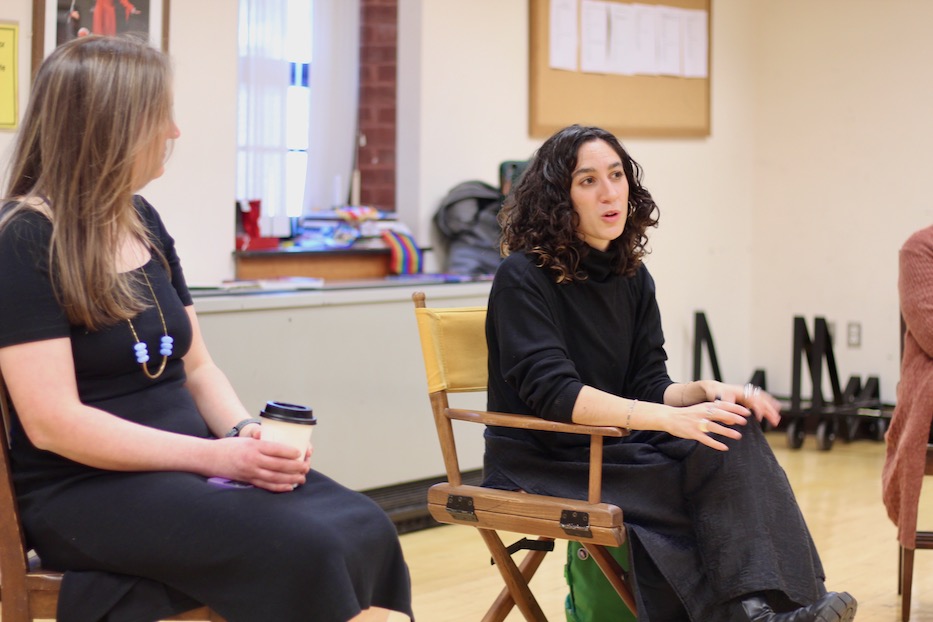
Culture & Community | Education & Youth | Educational Center for the Arts | Arts & Culture | Theater | Arts & Anti-racism
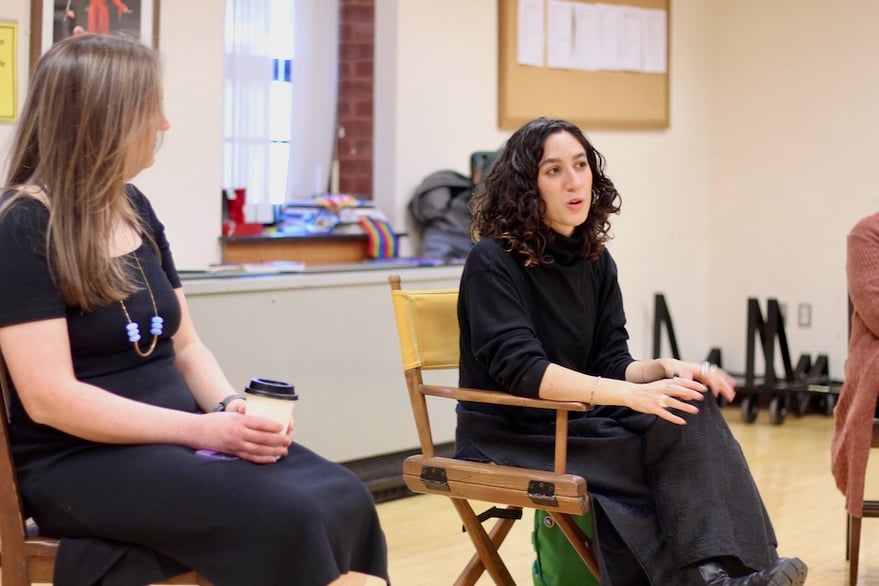
Dramaturg Amy Boratko and Director Sivan Battat (ECA Drama Chair Ingrid Schaeffer is to their right). Lucy Gellman Photos.
Educational Center for the Arts junior Denise Wray sat all the way forward in her chair, as if she was about to deliver a monologue. A story poured out of her: she loved her studies in theater, but had suddenly found herself in a slump. She wasn’t sure how to get out of it. And now she had a job and school work hanging in the balance.
From across the room, director Sivan Battat gave her an answer she hadn't yet considered: it was okay to take a pause. In fact, sometimes it was necessary. And then, she could return to theater as a form of community organizing.
Wray's whole body relaxed in an instant. Battat had given her the directing notes she needed to live her life.
Battat, an Iraqi American theatermaker who grew up in Woodbridge and graduated from ACES Educational Center for the Arts (ECA) in 2011, is the director behind Sanaz Toossi's Wish You Were Here, running at the Yale Repertory Theatre through Oct. 28. Last week, she returned to her alma mater just hours before opening night, to both speak on her own journey to directing, and drop some knowledge on current ACES ECA students who will see the show this week and connect with the cast later this month.
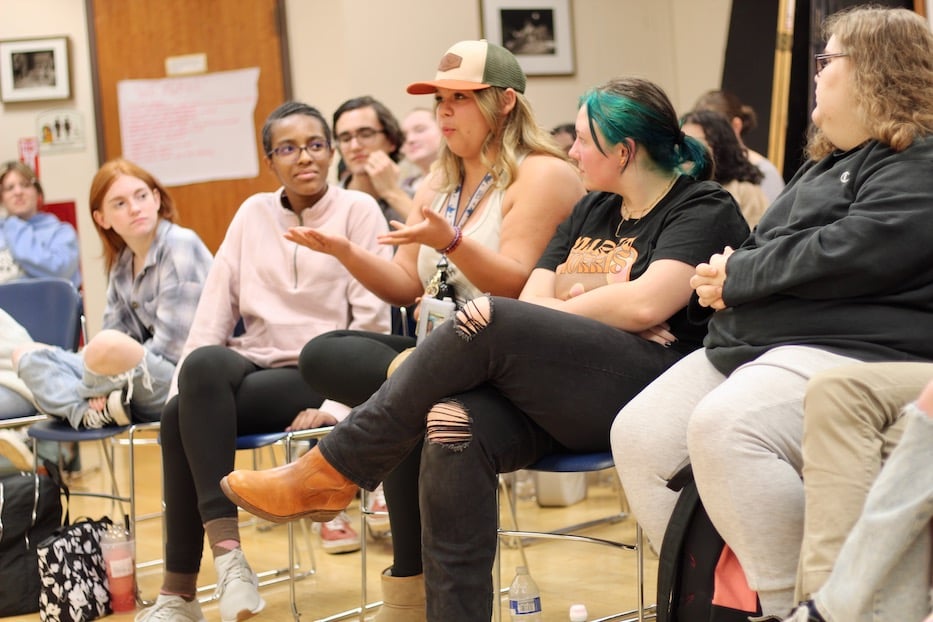
Wray (in the hat): "I'm struggling over here!"
"When I think of where I went to high school, I think of ECA first," she said, delighting at a series of old photos that still hung on the walls of a fourth-floor drama room. As she spoke, three dozen young thespians looked eagerly back. "ECA was really where my best friendships were, where my heart came alive, where my creative spirit came alive. And so many things transpired in this room!"
For Battat, who is now the director of new work development at Noor Theatre Company and travels across the country for directing projects, the road to theater always comes back to the arts high school, and to the Audubon Arts District. As a kid, she took acting classes with Ingrid Schaeffer, then (and now) the chair of ECA's theater program, at the school's Little Theater, a squat building that still sits at 1 Lincoln St. She loved them enough to keep doing theater through elementary and middle school, and then audition for ECA her eighth grade year.
The fact that she got in changed her life, Battat said. Her freshman year at ECA, Battat hit the ground running. In a playwriting class, she wrote and directed her first play with a group of friends, rehearsing for hours in same theater where she had discovered drama as a child. Her teachers "really saw that spark of directing in me," and pushed her to pursue it, she said.
"I just remember her inquisitiveness," Schaeffer said Thursday. "She was so curious about everything. It's so wonderful to have her back."
That was also where ECA's conservatory model came in. It was there that she could experiment, trying on different parts of theater making for size. When she didn't get a part in the school’s production of Into The Woods, she fell in love with absurdism through Eugène Ionesco's Rhinoceros. When she stepped into improv, she found a skill that still helps her pivot nimbly as a director today. If she floated an idea, there was a teacher always ready to help her execute it.
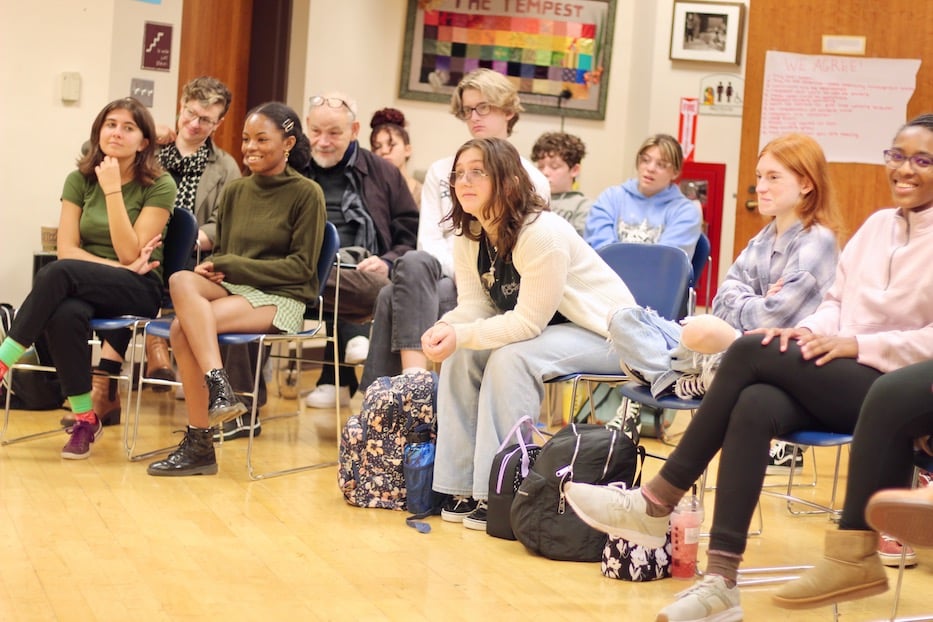
By her sophomore or junior year—she can’t remember which—Battat had joined theater teacher Joan McAfee as a teaching assistant, learning how to be a better director herself as she mentored younger students in the craft. Already, she could feel how directing called to her, from in-school performances of A Midsummer Night's Dream to weekly visits to a local elementary school with drama teacher Peter Loffredo.
"I just remember loving learning acting, but I loved learning how to be on the outside of the story too just as much, if not more," she said. Around the room, students leaned in to listen, some with their chins in their hands as if they were hiply-dressed freeze frames of Rodin's The Thinker. "And I loved working with my friends—helping them unlock something in their own performance."
It primed her for her work as a theatermaker at Wesleyan University, where she headed to study acting and directing before moving to Washington, D.C. and New York City after college. Even there, she said, ECA laid the academic foundation. Her freshman year, it led to her decision to insert a manmade, indoor river into Sarah Ruhl's Eurydice, a choice that proved as disastrous as it was ambitious ("totally ruined the stage" she said to laughs). Her senior year, it drew her back to Jean-Claude van Itallie’s The Serpent.
In between, her studies confirmed how much she loved directing—even while studying acting at the Moscow Art Theatre her junior year.
Since graduating, she said, she's picked up bits of industry knowledge that she wishes she could have shared with her younger self—and is now glad to impart on young actors who may stay in the field after high school. From her post-college years as a directing fellow at Studio Theatre, she learned that she would have to advocate for herself and her time, because no one was going to do it for her.
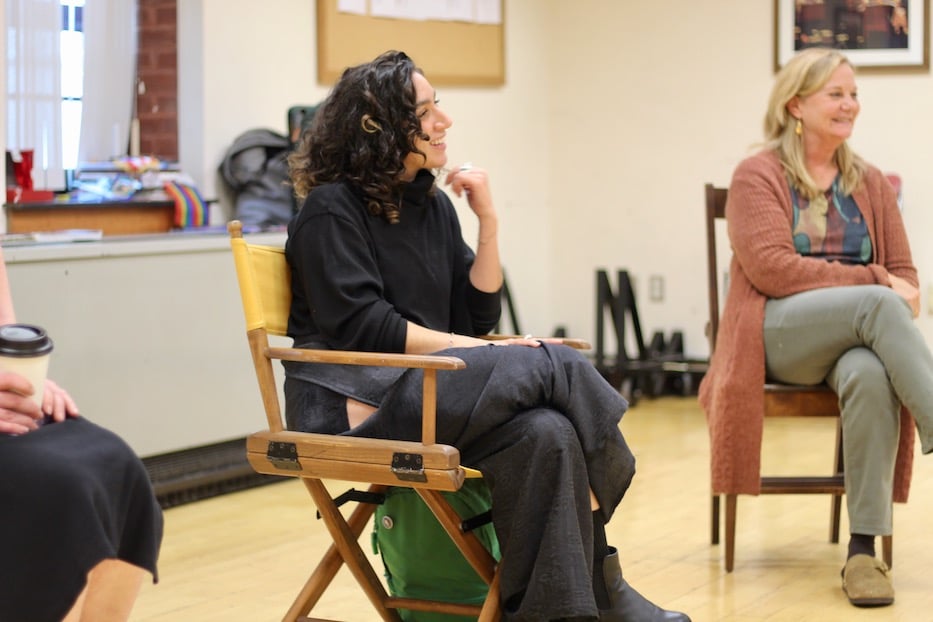
When she leapt into associate directing with theatermaker David Muse, it taught her that opportunity can mean traveling from one show to another, sometimes at an exhausting pace—and that there's a lesson waiting on each new stage. When she had the chance to help build a theater company that supported actors of Middle Eastern, Southwest Asian And North African descent, she rose to the challenge because she knew how meaningful that seat at the table could be.
Now that Wish You Were Here has brought her back to New Haven, she's sharing that decade of knowledge with young theatermakers. Fielding questions that ranged from work-life balance ("I have a social life!" she insisted with a laugh, before admitting that she took a meeting on the walk over) to favorite genres ("just good plays") to the importance of rest and reflection ("you can't create art if you don't have time to think"), she reminded students that there is not only sheer and transformative magic in the work that they do, but also immense power.
"There are so many roles you can play in making theater come alive, in making a story come alive," she said. Part of that, she added, is finding and holding tight to a rhythm that feels manageable for them, even on its busiest days. For her, that required taking a year off from theater, and then coming back to it before she was ready to fully commit to her work in the field. Now, she jumps into each work she directs, with "a tremendous amount of research” and a spirit of collaboration in which she revels.
"The actors that I work with are my collaborators,” she said. “They're not my employees. They're not my students. They're my collaborators. They bring to the table their own creative process, their own compositional work, their own imaginations, and we work together to build that into a play, to build that into a production."
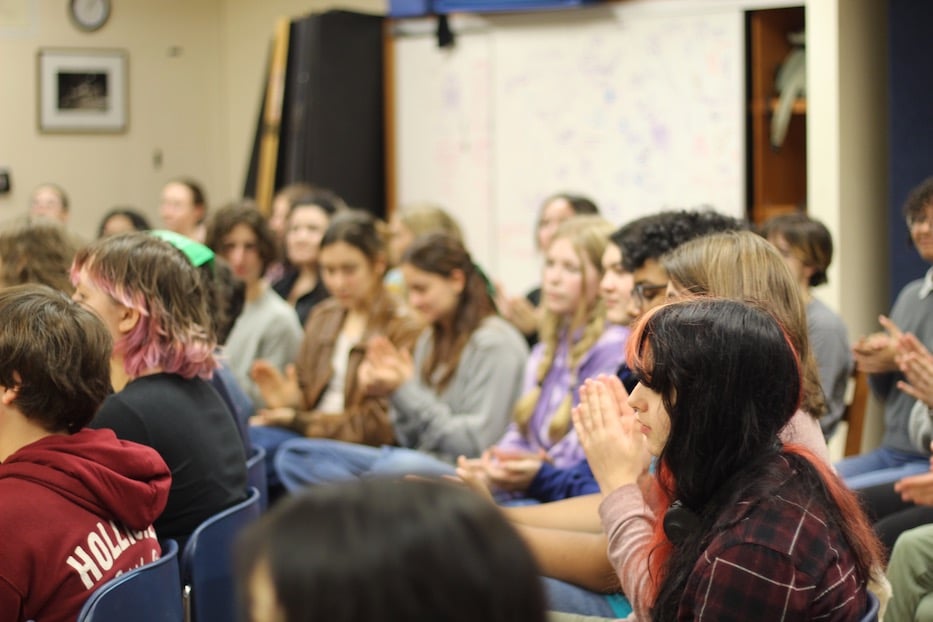
As she directs in New Haven—in many ways, her home turf—she brings all of that to the Yale Rep. While Wish You Were Here takes place in a 13-year period that sees the Iranian revolution and the entirety of the Iran-Iraq war, it is much more about the tight-knit group of women at its center, and the way their friendship must stretch and contract and change to sustain them during that time.
Applauding the play’s set, deft casting, spot-on set design and nimble direction, Schaeffer noted the roles that both conversation and silence play in the show, particularly as characters rotate in and out. She praised Battat for the degree of cultural sensitivity in the show, encouraging students to look into the history of the time, which came almost five decades before they were born, before seeing the play.
“When you come from a culture, and you know that family, and you know that history … it’s just so big,” Schaeffer said, tearing up as she recalled hearing correct pronunciation of the word Iran onstage. “I know that might not seem like a big thing, but when we went to the theater and I was sitting there and I heard words pronounced correctly, it just makes the experience so different if you know that culture.”
That’s very much on Battat’s mind in all of her work, she said. Addressing a need for representation in the field, she noted that it's never too early to think about equity and education on and off stage.
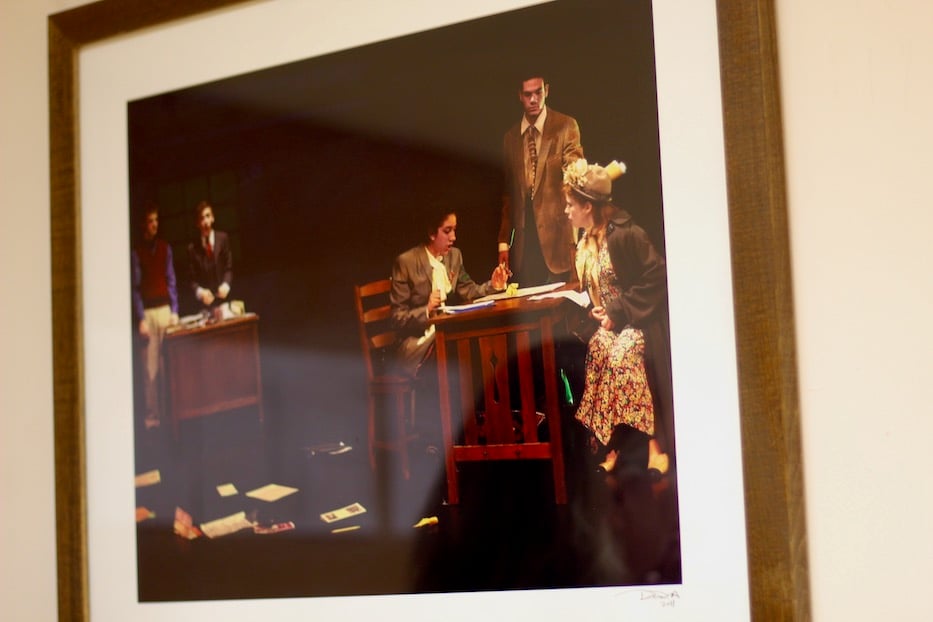
Battat during her ECA years.
When Schaeffer asked if she thought a work like Wish You Were Here—which has an entirely Iranian cast—would fly at ECA, Battat teased out a clear difference that she sees between educational work and actors' professional lives. At ECA, where students of all backgrounds for years participated in the August Wilson Monologue Competition, the answer resonated.
"There's so much to be learned from the work of writers that are different from you, whatever your cultural identity," she said, adding that it’s also personal—it took her years to find a Middle Eastern community in college. "There's so much to be learned from studying and learning about writers who are writing about people who are different than you. And I would just say, approach with great care and with great humility. And be graciously wrong. Learn how to be wrong about something."
For Mila Walters, a freshman at the school who also attends Jonathan Law High School in Milford, the feeling resonated. Walters' mom is an immigrant from Azerbaijan, who came to the U.S. when she was 17. When she’s is watching television or film at home, she'll often complain to her kids about how few Russian-speaking actors play Russian characters. More often than not, Walters said, it'll be an American actor with a bad accent and a villain stereotype that they can't shake.
Jules Vasas, a junior at the school, echoed the feeling. As a young LGBTQ+ artist, they're too used to seeing roles for queer characters go to straight actors with no lived experience. It can feel frustrating "seeing it played by someone who may not understand it," they said.
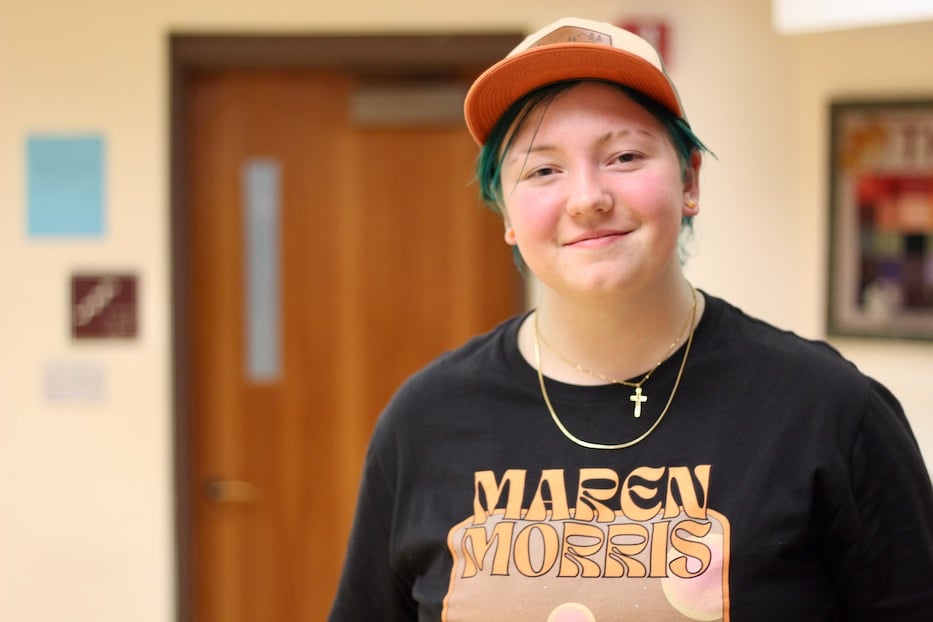
Jules Vasas.
Other students held onto Battat's words on balance. Just moments before the director hurried to get back to the theater to usher in opening night, Wray's hand went up from where she sat in the front row. She explained that she had just started working as an actor on the Essex Steam Train, and had lost her mojo somewhere between work, assignments for her sending school in North Branford, and ECA's rigorous theater curriculum.
"I'm struggling over here!" she said with a laugh.
"You can only be in one place at a time," Battat said. "And just, like, remembering that for yourself. I have to remind myself, I can only be in the room for the moment that I'm in right now. When you're really busy and back to back, I think that all you can do for yourself is like, remind yourself you can't be everything to everyone. You can't be everywhere for everyone. You can't do everything everyone's gonna ask you all the time. You just have to be present where you are."
"I get it," she added. "Good luck."
Sanaz Toossi’s Wish You Were Here runs at the Yale Repertory Theatre, 1120 Chapel St., through Oct. 28. Tickets and more information are available here.

